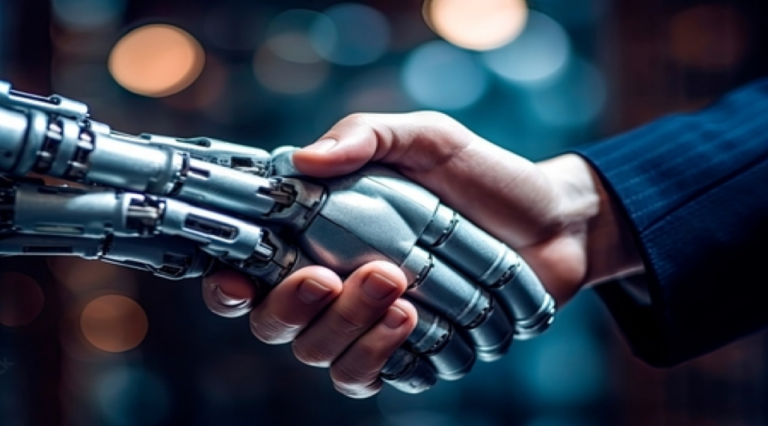AI Revolutionizing Engineering

In modern engineering, there’s a technological force reshaping the way we design, maintain, and implement autonomous systems – Artificial Intelligence (AI). This transformative power of AI is not just a buzzword but a groundbreaking reality that engineers need to embrace.
Let’s unravel the ways in which AI is optimizing designs, predicting maintenance needs, and propelling us into an era of autonomous engineering solutions.
Introduction to AI in Engineering
The integration of Artificial Intelligence into engineering processes marks a shift that goes beyond conventional methodologies. Engineers are no longer just architects of structures or designers of systems; they are now orchestrators of intelligent algorithms and neural networks. AI brings a new dimension to problem-solving, offering a level of efficiency and precision that was once thought to be the stuff of science fiction.
The marriage of human creativity with algorithmic precision is reshaping the landscape of smart design. Traditional design processes, driven by human intuition, now incorporate AI’s data-driven decision-making, resulting in designs that are not only aesthetically pleasing but also functionally superior. The efficient integration of AI into the design phase marks a monumental leap forward.
AI isn’t here to replace engineers; it’s a partner enhancing creativity with data-driven insights.
Tip: Embrace AI as a design partner, allowing it to complement your creativity with data-driven insights. Leverage AI tools for designing, testing various parameters guiding you to optimal solutions efficiently.
Design Optimization
Traditionally, design processes were driven by human creativity and intuition. While these qualities are irreplaceable, AI adds a layer of data-driven decision-making that enhances the efficiency of the entire design process.
Imagine an engineer working on a complex structural design. AI algorithms analyze vast datasets of similar projects, considering factors such as materials, environmental conditions, and structural integrity. This not only speeds up the design phase but also ensures that the final product is optimized for performance and durability.
Predictive Maintenance: Enhancing Reliability and Reducing Downtime
In engineering, the concept of predictive maintenance has become a game-changer. Traditional maintenance approaches often rely on fixed schedules or reactive responses to failures, leading to downtime and increased costs. AI, however, introduces a proactive approach by predicting maintenance needs based on real-time data.
Consider a scenario where AI algorithms monitor the performance of industrial machinery. By analyzing data such as temperature, vibration, and usage patterns, AI can predict when a component is likely to fail. This predictive capability allows engineers to schedule maintenance activities precisely when needed, minimizing downtime and extending the lifespan of equipment.
Autonomous Systems
The concept of autonomous systems, once confined to the world of science fiction, is now a tangible reality thanks to AI. From self-driving cars to drones and robotic manufacturing processes, AI is powering the autonomy revolution in engineering.
In the automotive industry, for instance, AI algorithms process real-time data from sensors, cameras, and lidar systems to make split-second decisions, ensuring safe navigation through complex environments. Similarly, in manufacturing, autonomous robots equipped with AI capabilities can adapt to changing conditions on the production line, optimizing efficiency and minimizing errors.
Tip: Stay abreast of advancements in AI-driven autonomy within your specific field. Understanding how AI enables autonomy opens doors to innovative solutions that can redefine the capabilities of engineering systems.
The Role of Continuing Education in Harnessing AI’s Potential
As AI becomes increasingly integrated into engineering practices, the need for continuing education becomes paramount. Engineers must stay updated on the latest AI tools, algorithms, and applications relevant to their fields. Many professional development programs now offer courses specifically tailored to AI in engineering, covering topics from machine learning basics to advanced applications in design and automation.
Continuing education is the key to unlocking the full potential of AI in engineering. As technologies evolve, so must the skills of engineers. Courses focusing on AI applications in engineering not only enhance technical expertise but also provide insights into the ethical considerations and societal impacts of AI-driven solutions.
It’s not just education; it’s your competitive edge.
Tip: Invest in your professional development by exploring courses and certifications that focus on AI applications in engineering. This not only enhances your skill set but also positions you as a valuable asset in the evolving landscape of AI-driven engineering.
Challenges and Opportunities
Every superhero faces challenges, and AI is no exception. While AI brings unprecedented efficiency, it also poses challenges, including data privacy concerns, algorithmic bias, and ethical considerations. Engineers must navigate these challenges to ensure AI’s responsible and equitable deployment.
AI opens doors to new possibilities in fields such as environmental engineering, medical technology, and sustainable infrastructure. The intersection of AI and engineering holds the promise of addressing global challenges and creating a future where technology serves humanity responsibly.
Tip: Embrace the challenges as opportunities for growth. Stay informed about ethical considerations and contribute to shaping the future of AI in engineering responsibly.
Ethical Engineering: A Call for Responsible AI Use
Ethical considerations are central to the responsible deployment of AI in engineering. From addressing bias in algorithms to ensuring transparency, ethical engineering is vital. Engineers should actively engage in discussions within professional communities, advocating for ethical standards that balance technological advancements with societal well-being.
Tip: Engage in discussions about the ethical implications of AI to ensure that the benefits of AI are realized without compromising ethical standards.
Your voice shapes the responsible use of technology.
Engineering the Future with AI
It is evident that we stand at the threshold of a new era. AI is not here to replace engineers but to empower them with tools that can amplify their capabilities and usher in unprecedented levels of efficiency and innovation.
Embracing AI in engineering is not just a professional choice; it’s a necessity in a world where technological landscapes evolve rapidly. Continuing education, a commitment to ethical considerations, and a proactive approach to integrating AI into engineering practices will position engineers at the forefront of this transformative wave.
So, dear engineers, the future is AI-driven, and it’s beckoning you to be the architects of this new reality. As you navigate the ever-changing currents of technology, remember that the interaction between human ingenuity and artificial intelligence is the key to unlocking engineering marvels yet to be imagined.
In this age of AI-driven progress, the role of engineers is more crucial than ever. The bridge between human intellect and machine precision is where the future of engineering lies, and it’s a future that demands continuous learning, ethical responsibility, and a pioneering spirit.
As you step into this AI-driven future, remember, the journey is as important as the destination, and with every algorithmic replication, you are carving the future of engineering.
Tip: Draw inspiration from real-world success stories. Understand how AI can be applied in your specific projects for tangible benefits.
